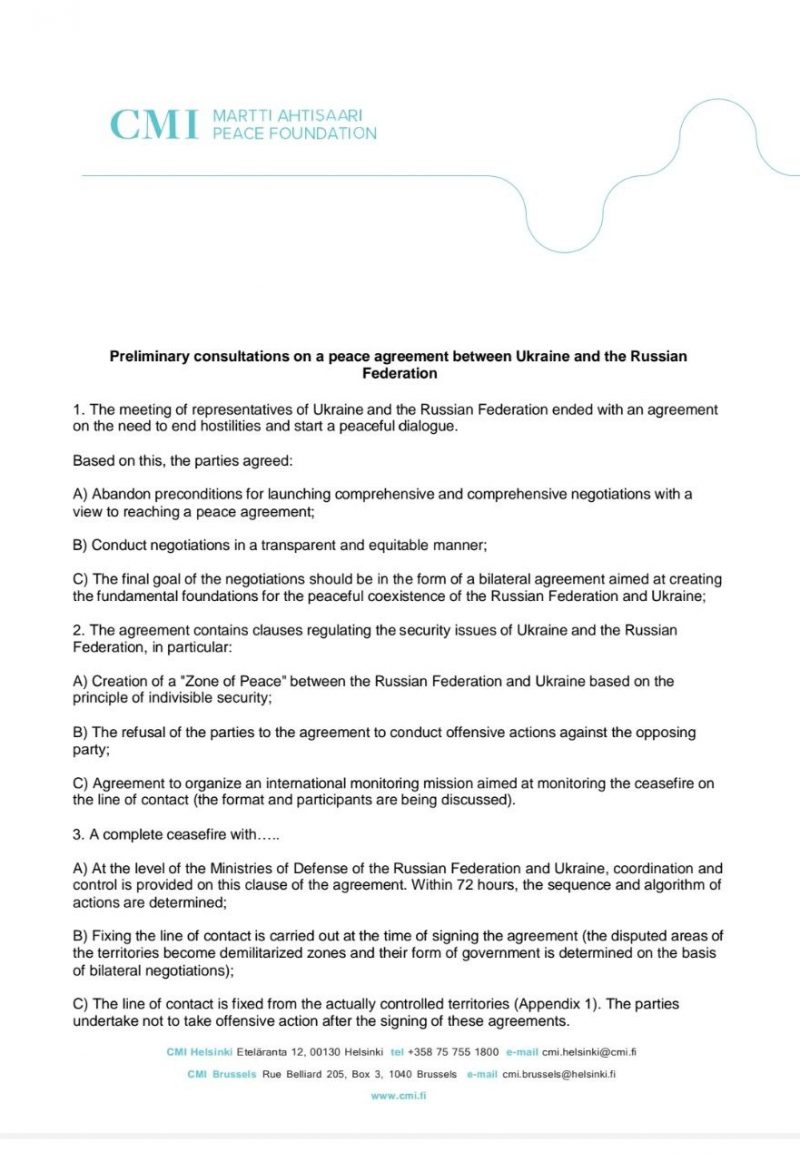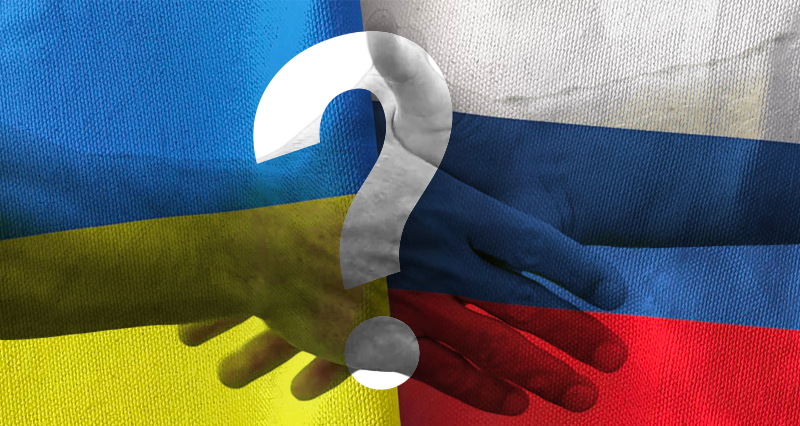Istanbul hosted several official and unofficial talks on the Russia-Ukraine conflict. During the Istanbul talks, Russian and Ukrainian officials had almost come to an agreement with Türkiye’s mediation. This agreement, which did not suit the U.S.’s purpose, was undermined with the provocation in Bukcha last year.
Then the Grain Corridor Agreement was signed once again with Türkiye’s mediation. This agreement has been extended and continues to be valid.
Istanbul’s role in mediation attempts between Moscow and Kiev is not limited to these. In today’s article, we will touch upon another mediation attempt behind the scenes.
Unofficial delegations met
This time, Finland is mediating unofficial talks between the two sides. The CMI – Martti Ahtisaari Peace Foundation, an independent organization of that country, published a document in the beginning of April 2023, of which the first page is displayed below. The document makes understood that an agreement has been achieved on certain points. It still needs to be emphasized that this agreement is the result of unofficial talks between the representatives of the two countries.
Looking at this document, differences from the official discourse of Russian and Ukrainian officials stand out immediately. However, sources close to the mediating country say that the meetings were attended by high-level representatives from both sides and that the process will advance further.

Articles of the agreement
The text calling for an end to the conflict and the start of negotiations is as follows:
Preliminary consultations on a peace agreement between Ukraine and the Russian Federation
1. The meeting of representatives of Ukraine and the Russian Federation ended with an agreement on the need to end hostilities and start a peaceful dialogue.
Based on this, the parties agreed:
A) Abandon preconditions for launching comprehensive and comprehensive negotiations with a view to reaching a peace agreement;
B) Conduct negotiations in a transparent and equitable manner;
C) The final goal of the negotiations should be in the form of a bilateral agreement aimed at creating the fundamental foundations for the peaceful coexistence of the Russian Federation and Ukraine;
2. The agreement contains clauses regulating the security issues of Ukraine and the Russian Federation, in particular:
A) Creation of a “Zone of Peace” between the Russian Federation and Ukraine based on the principle of indivisible security;
B) The refusal of the parties to the agreement to conduct offensive actions against the opposing party;
C) Agreement to organize an international monitoring mission aimed at monitoring the ceasefire on the line of contact (the format and participants are being discussed).
3. A complete ceasefire with…..
A) At the level of the Ministries of Defense of the Russian Federation and Ukraine, coordination and control is provided on this clause of the agreement. Within 72 hours, the sequence and algorithm of actions are determined;
B) Fixing the line of contact is carried out at the time of signing the agreement (the disputed areas of the territories become demilitarized zones and their form of government is determined on the basis of bilateral negotiations);
C) The line of contact is fixed from the actually controlled territories (Appendix 1). The parties undertake not to take offensive action after the signing of these agreements.
4. Verification of the ceasefire regime is carried out by a joint peacekeeping mission consisting of representatives (Ukraine, NATO, the Russian Federation, the CSTO);
5. Issues related to ensuring the rights and freedoms of the Russian-speaking group in Ukraine shall be determined by the joint commission on the basis of existing legislation;
6. Problems related to the operational management of the Zaporozhye nuclear power plant will be resolved based on the decisions of the Consultative Commission composed of representatives of the Russian Federation and Ukraine (creation of a demilitarized zone);
7. All detainees will be exchanged on the basis of the “all for all” principle;
8. Humanitarian supplies will be delivered, stored and distributed to those in need on the basis of international law and mechanism;
9. The Parties declare their readiness for the gradual restoration of socio-economic ties, including the return to bilateral and multilateral agreements regulating the socio-economic well-being of citizens.
Open negotiations might start
It is hard to predict whether these talks and the preliminary agreement will lead to a final result. However, it would not be surprising to see some open negotiations start between the two countries in the times ahead. Many different sources from various sides confirm information towards this tendency.

















Leave a Reply